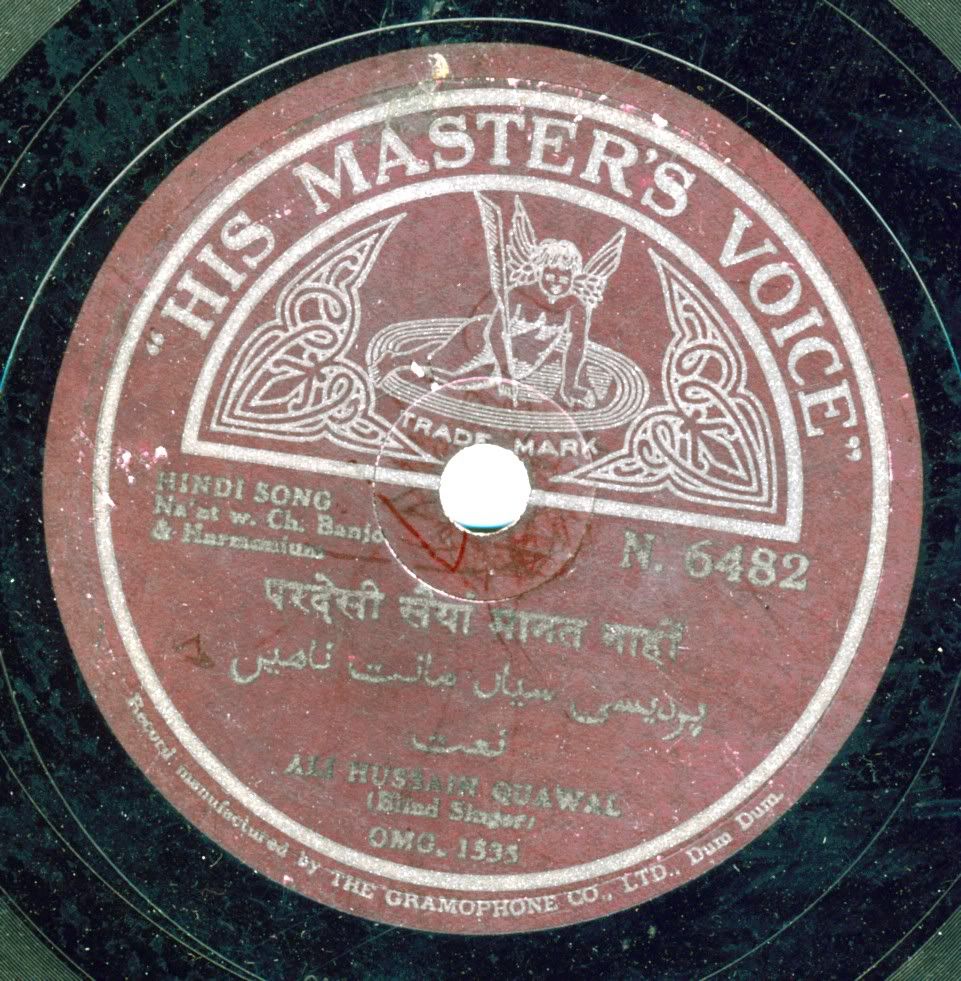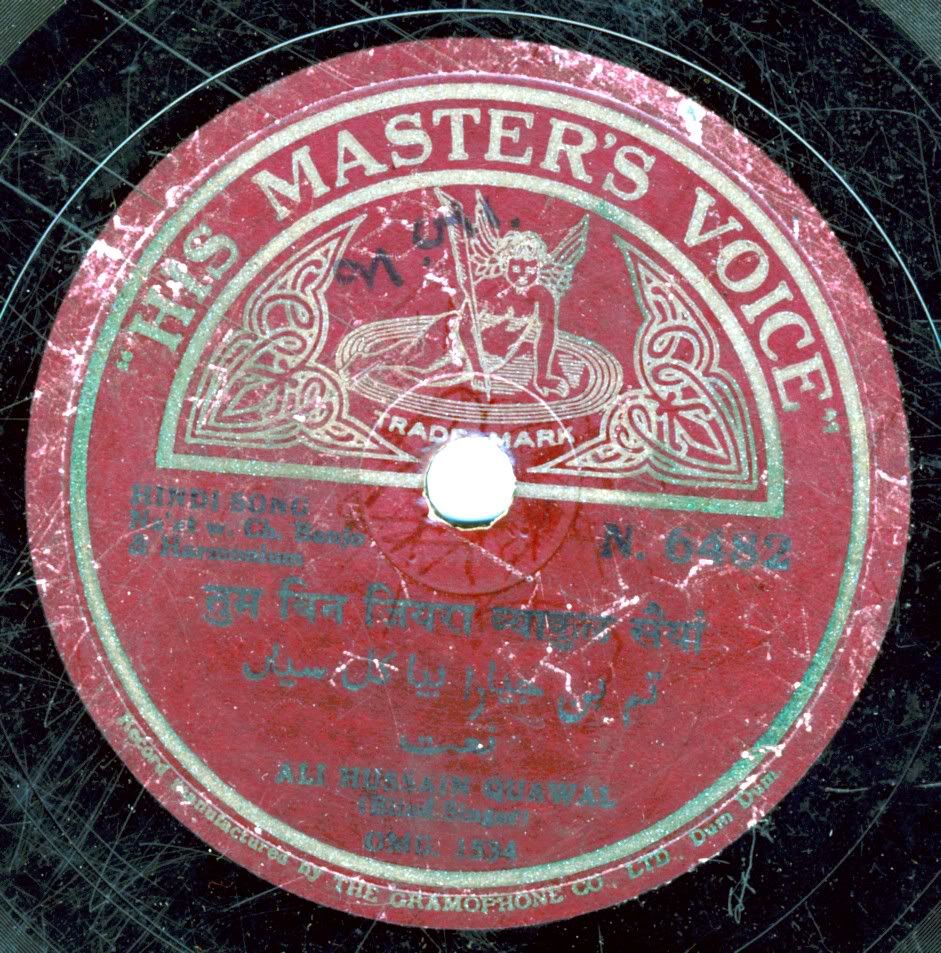India Indian music music vocalists: near genius thumri
by Warren
4 comments
Meta
SiteMeter
Brighter Planet
78 rpm Records of Indian Music: Bai Sundra Bai
Bai Sundra Bai was one of the most heavily recorded artists from the thumri culture of the early 20th century along with Gauhar Jan, Janki Bai and others. Originally from Pune, her repertoire included Marathi bhavgeets along with thumris, ghazals and occasional khyal performances. Her recording career extended into the late 1940s, with some work for films.

I enjoy these two thumri performances, both on fairly standard Krishna texts. Both show her flexible voice and excellent taan technique; the Tilak Kamod in particular is very impressive.
Tilak Kamod: “Avata hai giridhari”
Jhinjhoti: “Kanha charavata gaayi”
environment Politics: Al Franken Arizona fire management Forest Service Lisa Murkowski wildfires
by Warren
leave a comment
Meta
SiteMeter
Brighter Planet
Year 2, Month 6, Day 30: This Is Not Funny
Big fires happening in Arizona. Big discussions in the Senate. Al Franken brought something up:
Forest Service Chief Tom Tidwell, one of the witnesses present at the hearing, cited research from within the service to link fires and climate change.
(snip)
Tidwell’s testimony was prompted by Sen. Al Franken (D-Minn.), who used the positive response to chide committee members into considering climate change as one of the committee’s key issues.
“I would just like to underscore that for members of our body, when we have discussions about the impact of climate change, the cost of this,” he said. “It would be all well and good for members to understand that this is related to climate change, and how important it is for us to address and take national action to reduce our carbon emissions.”
Following which, Lisa Murkowski criticized the Government’s performance in handling fire management:
However, climate change was not the focus of members’ disapproval of current fire management. Energy and Natural Resources Committee ranking member Lisa Murkowski (R-Alaska) was quick to point to poor management and slow policy implementation as the primary factor for out-of-control fires, caused by recent cuts to the Forest Service budget as well as a strategy of tackling smaller areas rather than larger projects. Murkowski criticized the Forest Service for not implementing the Healthy Forest Restoration Act to its fullest extent. Less than a third of the authorized projects were ever completed, according to Murkowski.
Now, I don’t know a thing about Fire Management, or about how the Federal Government is handling it. There’s probably as much ineptitude there as anywhere else in a big bureaucracy, but I don’t see that as an anti-government argument; it’s an anti-ineptitude argument.
But today I was in a hurry, so I just pointed out that Republicans are anti-science dingleberries without exception. Easy. Sent June 15:
As Alaska’s Senator Murkowski asserts, lags in implementing forest management policy are a big factor in forest fires like the one currently devastating huge swaths of Arizona. As Senator Franken points out, so is climate change. And there in a nutshell is the difference between the two parties’ approaches to environmental issues. Republicans bend every effort to underfund essential programs, then cite their failures as reasons to mistrust “big government.” Republicans are forced — from above by their energy-industry sponsors, from below by their ideologically inflamed tea-party base — to deny the relevance of basic science. When it comes to environmental policy, necessarily based on measurements, facts, and probabilities, the GOP’s approach is practically surrealist in its gleeful disregard of ideologically inconvenient expertise. Whether or not the Wallow fire is directly linked to climate change, the connection between Republican climate denialism and the failure of American environmental policy is unequivocal.
Warren Senders
India Indian music music vocalists: geet tappa thumri
by Warren
3 comments
Meta
SiteMeter
Brighter Planet
78 rpm Records of Indian Music: Miss Indubala
For a self-described “amateur,” Miss Indubala recorded very prolifically, as this discography shows. Of course, the word “amateur” was code for “Do Not Mistake Me For A Tawaif.”

Miss Indubala: 1899-1984.
This is an unusual piece. The opening mukhda and much of the following singing uses frequent tappa-ang taankari, but the text is Hindi, and describes Lord Shiva — playing the games of Holi!
I have never heard any other Hori composition which includes Shiva in the festivities.
The other side of the record, unfortunately, has so many skips and pops in it that trying to piece together the performance is beyond me at the moment.
Indubala’s life story would make a good movie:
Indubala’s mother was Rajabala, who along with sister Matibala and brother Tinkary worked in Motilal Bose’s The Great Bengal Circus, also known as Bose’s Circus or Professor Bose’s Circus. Harimati was the eldest sister of Rajabala and had a different life. Rajabala performed mainly as a trapeze artiste and got married to Motilal Bose at a temple in Ujjain, India. At the time he was then in his forties while Rajabala was still a teenager. The marriage was never accepted as legal by Motilal’s family. Motilal Bose’s first wife was Mrs. Annadamohini Devi. Indubala was born in Novenber, 1899 at Amritsar, where the circus party had gone for performance. Indu was born premature and Dr. Bidhumukhi Basu was taken to Amritsar from Calcutta to attend to Rajabala. Such was the affection and concern of the husband for his young wife. Motilal’s interest in Rajabala dwindled later, supposedly because Rajabala showed no interest in going back to the circus after Indu’s birth and soon she was left to fend for herself. She came to Calcutta with her daughter and was given shelter by a Jiban Krishna Ghosh, who remained loyal to her till his death and also played a major role in establishing Indubala in her life as a performer. Once in Calcutta, Rajabala trained herself as a singer and Indubala’s first training in music was from her mother. The initial plan was to train Indu as a nurse and she was admitted as a trainee in a hospital in the Pataldanga locality of Calcutta. Indu did not take fancy in the job and ran away from the hospital, much to the disappointment of her mother, who never wanted her only daughter to be forced into a life of indignity. After this incident Indubala’s musical training started. Although her father ignored wife Rajabala completely, he remained fond of his daughter and kept in touch with her and often invited her to his ancestral home where he lived during his brief visits to Calcutta and sent her a monthly pocket money of Rupees twenty till his death. Indubala’s first performance was at a gathering of distinguished guests where her mother was the chief entertainer. Each one of the guests appreciated Indu’s singing and thus began her formal training from Gouri Shankar Mishraji. Indu was only about twelve then. This also marked the entry of Indubala into the red light world. Amongst her trainers were Kali Prasad Mishra, Elaahi Bux and Miss Gauhar Jaan. Apart from music, Miss Gauhar Jaan, credited as Prima Donna of India, Indu also learned etiquette from the elder artiste and developed a close friendship with her. This association provided Indu with valuable musical knowledge and experience.
India Indian music music vocalists: Marathi bhavgeet near genius
by Warren
leave a comment
Meta
SiteMeter
Brighter Planet
78 rpm Records of Indian Music: G.N. Joshi
G.N. Joshi was both a singer and the main A&R man for HMV India; “Down Melody Lane,” his reminiscences of a life in music, is an excellent read.
Here are two of the Marathi geets he recorded at the beginning of his career.
His voice production is easy and clear, and he handles the melismatic passages with aplomb.
The next item is based on the popular afternoon raga Patdeep, and includes some lovely improvisation; it is a khyal performance in all but name. Joshi’s melodic imagination is captivating; the piece ends with some excellent taankari.
environment: conservation energy efficiency
by Warren
leave a comment
Meta
SiteMeter
Brighter Planet
Year 2, Month 6, Day 29: Sense and Sensibility…
The Ocala Star-Banner editorializes about the need for energy conservation:
The key to energy independence — as well as cleaner energy and a sustainable environment — is to reduce consumption through conservation. And Americans can do that. In fact, we have done it.
As part of a national campaign to reduce oil and gasoline use and foster energy independence, Congress should again enact conservation strategies such as those recommended in a 2009 report by the business consultant McKinsey & Co.
McKinsey cited research showing that — through energy efficiency alone — “the U.S. economy has the potential to reduce annual non-transportation energy consumption by roughly 23 percent by 2020.”
The recommendations include: 1) better consumer education on potential energy-efficiency savings; 2) tighter efficiency requirements for appliances, and 3) stronger financial incentives for energy improvements.
I figured a little support was in order. Sent June 14:
Looking at the social history of the word “conservation,” it’s obvious that Ronald Reagan’s fundamentally wasteful worldview has become the national norm. The simple facts of energy efficiency would seem to make it an inherently attractive proposition — burn less, save more. Leaving aside the spurious debate about global climate change, the steadily rising cost of energy should make this a no-brainer. But many of our fellow citizens have absorbed the notion that conservation is somehow alien to the American character; listening to Rush Limbaugh and others of his ilk inveighing against anything that would change our rate of consumption is deeply disturbing. We should remember that recycling and reduced usage patterns were part of what brought America to victory in World War II, and are key to establishing our energy independence today. “Conservation” is a social good in every respect; it is “waste” that is, literally, a dirty word.
Warren Senders
India Indian music music: clarinet genius
by Warren
leave a comment
Meta
SiteMeter
Brighter Planet
78 rpm Records of Indian Music: Rajan Sarkar And Keramatullah Khan
The clarinetist Rajan Sarkar, accompanied by the great tabliya Ustad Keramatullah Khan. I greatly enjoy these performances; it’s a shame that Sarkar is not better known. He is mentioned in Greg Booth’s 1997 article “Socio-Musical Mobility Among South Asian Clarinet Players,” and his name appears in connection with the early Bombay cinema music scene.
Dhun
This version of Malkauns is a rough adaptation of the vocal bandish Koyaliya bole ambuva, one of the most commonly taught compositions in this raga. On both renditions, Keramatullah Khan’s accompaniment is terrific; wonderful fat sound and righteous theka playing.
environment Politics: idiots New Hampshire Republican obstructionism RGGI
by Warren
leave a comment
Meta
SiteMeter
Brighter Planet
Year 2, Month 6, Day 28: Doesn’t Sound Very Manly To Me, George…
New Hampshire is in a struggle between wise and witless:
CONCORD, N.H.—New Hampshire’s participation in a regional program designed to reduce carbon dioxide emissions is still up for debate in the Legislature despite the Senate sending legislation to the governor repealing the state’s law.
The Senate sent a bill to Gov. John Lynch that both ends New Hampshire’s participation in the program and also modifies the state’s shoreland protection law. Lynch promises to veto any bill that ends New Hampshire’s participation in the Regional Greenhouse Gas Initiative. The Senate can’t override a veto repealing RGGI, but wants the shoreland protections.
But we all know what’s really going on. Sent June 13:
The Republican-dominated state government of New Hampshire is, typically and reflexively, against any state initiative which acknowledges the existence of human-caused climate change, or makes an effort to reduce the greenhouse gas emissions that are causing it. The recent bill ending the state’s participation in the Regional Greenhouse Gas Initiative is a case in point. While the scientific consensus is overwhelming, and the evidence correlating planetary heating with an increase in extreme weather throughout our country and the world is accumulating ever more rapidly, Republicans have committed themselves to denying the reality in front of their eyes. It’s a positive step that Governor Lynch plans on vetoing their plans to drop out of the RGGI, which is on track to be one of the relatively few success stories in the complex history of America’s attempts to deal with the looming threats posed by global climate change.
Warren Senders
Indian music music vocalists: 78 rpm discs geet ghazal thumri
by Warren
1 comment
Meta
SiteMeter
Brighter Planet
78 rpm Records of Indian Music: Ali Hussain Quawal
Here are two songs by an artist about whom almost no information is available. The record label simply states “Ali Hussain Quawal (Blind Singer).”

The short instrumental interludes between stanzas are fascinating.

==========================================
“Tum bina jiyara vyakul saiyan”
==========================================
“Pardesi saiyan manata nahin”
environment: Conservatives denialists idiots Rocky Mountains Water
by Warren
leave a comment
Meta
SiteMeter
Brighter Planet
Year 2, Month 6, Day 27: We Used To Use These On Mountainsides.
The Christian Science Monitor addresses the study of decreasing snow mass in the Rockies:
A blend of natural climate swings and global warming appears to be driving a long-term decline in snowpack along the Rocky Mountains rarely seen in the past 800 years.
In the process, and perhaps more important for the future, the dominant driver behind available snowpack along the continental spine appears to be shifting from precipitation to temperature, according to a study published Friday in the journal Science.
If this shift holds, the study’s team adds, it could represent a change that would accelerate the loss of the West’s natural freshwater reservoirs – if long-term average temperatures continue to rise with increasing levels of industrial greenhouse gases, as most climate scientists are convinced they will.
Ski the Rocky Mountains while you can, kids.
Sent June 12:
There aren’t a great many surprises in the new study of the Rocky Mountains’ shrinking snowpack. Rather, we find evidence that supports hundreds of other studies in the confirmation of a troubling planetary trend. The Earth is warming; human beings are causing it with emissions of greenhouse gases; it’s going to affect ecosystems all around the world in complex and disruptive ways. The Rocky Mountains are one such area, and their decreasing snow mass is going to have significant effects on the water usage patterns of the entire American West. It is a tragedy in the making, exacerbated by an ideologically-based refusal of “conservatives” to acknowledge scientific reality and its implications. In fact, self-styled conservatives are the real radicals when it comes to climate: by advocating a rapid transformation of the Earth’s atmosphere to unexplored extremes, they’re endangering all of us. That’s not conservatism, that’s reckless insanity.
Warren Senders
India Indian music music: musical oddity near genius syncretism
by Warren
7 comments
Meta
SiteMeter
Brighter Planet
78 rpm Records of Indian Music: The Dacca Orchestral Party
This enchanting ensemble is a mix of Indian and Western instruments with occasional vocals. Googling the name “Dacca Orchestral Party” yields nothing. I wonder: would you have heard this group playing in the lobby of a Grand Hotel in the 1920s?
Wonderful. Surely one of the earliest pieces of East-West Fusion in existence.
Raga Kafi:
The little vocal interlude is priceless.
=========================================
Raga Bhairavi:
The string/percussion section at 2:38 is timbrally fascinating. I could never have imagined such a combination; it almost recalls some of Harry Partch’s orchestrations.
